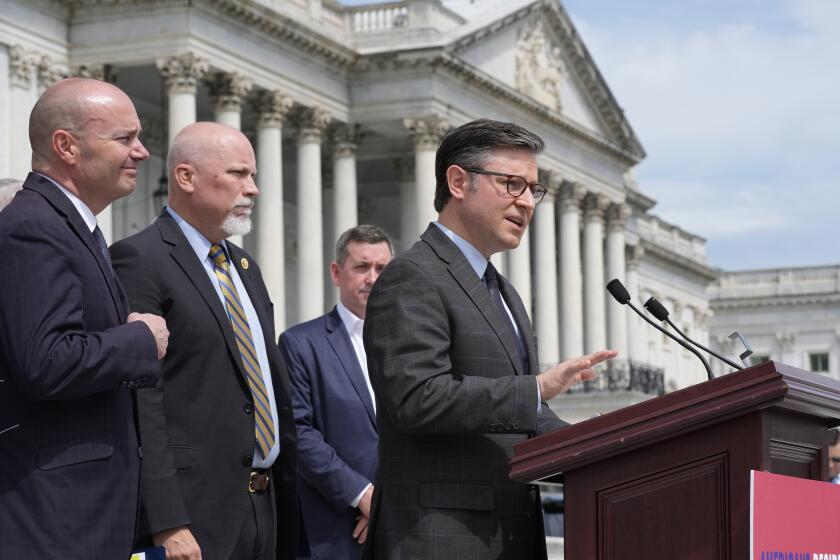Farm Belt Seeds Political Soil With Clout
State Treasurer Matt Fong, campaigning for the GOP nomination for U.S. Senate, stopped at a retirement home in this rural town just off the highway between Stockton and Modesto.
He delivered a standard stump speech about crime, taxes and education and then asked for questions.
Given the age of his audience, the first question might well have been about Medicare or Social Security. But here in California’s farm belt, the first question, delivered in a strong, insistent voice by an 80-year-old man with a no-nonsense gaze, was: “What are you going to do for California’s farmers?”
Fong responded that one of the first things he wants to do is reduce inheritance taxes that often force farm families to sell their property. His questioner nodded in agreement.
Fong has also visited a cheese “museum” to talk to dairy farmers. He has promised a “major policy address” on agriculture next month in Bakersfield and is scheduled to campaign at a water conference in Monterey attended by water district officials from farm areas.
He and other candidates are reacting to that paradox of modern California agriculture: Farm revenue and production are at record levels, but so is angst and activism among the owners and operators of the state’s 80,000-plus farms.
Many farmers are convinced that they are trapped in a losing battle for survival against taxation and governmental regulation. This despite the fact California leads the nation in agricultural production and income.
Political action committees representing California agribusiness are stepping up their political contributions and spreading their largess to out-of-state congressional representatives.
Through their PACs, farmers would like to win friends and influence federal policies on issues including pesticides, the Endangered Species Act, water allocation, guest workers from Mexico and food-quality regulations now being written.
Farmers are also learning the ways of “independent committees” that allow them to support friendly legislators and skirt limits on contributions to political campaigns.
The California Farm Bureau has escalated its Washington lobbying and this week will take 29 farmers to Washington to visit all 52 congressional representatives from California, both U.S. senators and high-level bureaucrats at the Department of Agriculture and the Environmental Protection Agency.
“When it comes to political influence, the farmer is the low man on the totem pole,” said Rick Veldstra, who grows almonds, alfalfa, beans, corn, oats, tomatoes and wheat in the San Joaquin Valley. “Farmers feel left out of the loop when political decisions about their livelihood are being made.”
At about $25 billion in annual value, California agriculture is the state’s largest industry. One in 10 jobs is linked to agriculture.
The top agricultural counties are Fresno, Tulare, Kern, Monterey and Merced. But even San Diego County, which is better known for tourism and military bases, has an agricultural economy that exceeds $1 billion annually, thanks largely to avocados and flowers.
Tom Pecht, who grows lemons and avocados in Ventura County, says younger, better-educated farmers are more willing than their elders to get involved in politics. Pecht has hosted congressional visits and taken part in an industry-sponsored leadership program.
“Today’s farmer is not the farmer of 50 or 60 years ago, sitting around in blue overalls, with a straw hat and some straw in his mouth,” Pecht said. “Farming is a business, and you’ve got to lobby on its behalf, just like other businesses are doing.”
Down-to-Earth Campaigning
With agricultural issues getting hotter, the state’s farm belt has become one of several battlegrounds in the U.S. Senate race.
During his candidacy announcement tour, Republican hopeful Darrell Issa spoke at a fig-packing plant in Fresno. On Friday, Issa received the endorsement of pro-agriculture Rep. George Radanovich (R-Fresno).
Although he has not provided detailed explanations of his stand on agricultural issues, Issa’s anti-government rhetoric is peppered with disdainful references to government red tape and restraints on private enterprise.
But Issa also committed a gaffe on an agricultural issue--a miscue Fong delights in relating to farm-belt voters. Asked in Sacramento about the Auburn Dam controversy, the political neophyte stammered that he did not want to meddle in California’s internal politics.
The long-stalled dam project is a federal initiative that pits farmers against environmentalists. A day later, after being briefed by his staff, Issa announced his support for the project--the same position held by Fong.
Fong often mentions how, as a member of the state Board of Equalization, he tried to get tax breaks for California ostrich farmers and how chagrined he was at failing: “We lost ostrich farmers out of California. It was stupid.”
Talking to editors of the Stockton Record, Fong chided his fellow politicians: “We somehow forget the anchor of California’s economy is agriculture.”
Whether it is Issa or Fong, the GOP nominee will have to work hard to pry agricultural support and money away from the incumbent, Democratic Sen. Barbara Boxer.
She enjoys support from a dozen agricultural PACs for her work on federal support for export and marketing plans, crop insurance and finding new markets for dates, almonds and sugar beets by persuading foreign governments to drop trade barriers.
During her candidacy announcement tour in February, one of the most enthusiastic gatherings was in Selma at the home of Girard Kasparian, “the raisin king.”
“My fights are your fights,” Boxer told the cheering crowd. “I will be there every single day fighting for you.”
But it appears unlikely the state Farm Bureau will endorse Boxer. It endorsed her opponent in 1992, and the group’s leader showed a preference for Rep. Frank Riggs (R-Windsor) before Riggs quit the race.
For many farmers, Boxer is simply too unwilling to modify the Endangered Species Act, too opposed to a guest-worker program and too equivocal on water issues for fear of offending her political base among Northern California liberals.
Farming’s Clout Had Been on Wane
One development that has jolted California farmers into increased activism was the passage last year of a bill phasing out the nation’s half-century-old system of price supports for certain crops.
While California farmers largely are not covered by the price support system, passage of the bill was proof to many that agriculture’s once-vaunted political muscle has atrophied.
By comparison with other committees representing doctors, lawyers, gun owners and labor unions, the amount distributed by political action committees from California agriculture was a relatively modest $800,000 in the 1996 election season.
Still, combined with individual contributions, one political fund-raiser estimates that California farmers and people with links to agriculture probably contribute more than $2 million to candidates.
“The farmers are just learning how to play this game,” said one political insider. “When they learn how to bundle their money and pick their targets, they’re going to be more of a force.”
Although farmers believe stoutly that they occupy the high moral ground, critics, such as those in the environmental movement, suggest that agriculture is complaining only because it is finally being held accountable by the government for its past wrongs--including cavalier treatment of workers, sloppy use of dangerous pesticides and profligate water consumption.
“What this is about is agribusiness and the agricultural-chemical business protecting their interests,” said Dan J. Weiss, national political director of the Sierra Club, of the increase in political activism. “Agribusiness uses farmers as pawns to present a good front.”
In recent elections, Republicans have received the lion’s share of agricultural money and support, with some notable exceptions. For example, Democratic U.S. Sen. Dianne Feinstein was endorsed by the state Farm Bureau for reelection in 1994.
Beyond giving money, farmers are hopeful that prowling the halls of Washington will bear fruit. George Longfellow, a dairy rancher from Hanford in Kings County, said he plans to issue a standing invitation to each member of Congress: Come visit a real farm before you make any laws.
“Most of them have no idea what we do on the farm,” Longfellow said.
Jack King, the state Farm Bureau’s manager of national affairs, said many farmers believe that paperwork and regulations imposed on farmers are increasing at such a rate that farmers may soon be required to get a governmental permit before a crop can be put into the ground.
“That’s a climate many farmers find very fearful,” King said.
Many agricultural issues are regional. Farmers in Marin County, for example, are concerned about the possible expansion of Point Reyes National Seashore, and farmers in Ventura County are worried about changes in local land-use planning.
Agriculture’s Hot-Button Issues
But four issues have statewide significance and are at the top of the list that farmers are carrying to Washington.
* Farmers want Congress to establish a guest-worker program to provide temporary visas to 25,000 farm workers, probably from Mexico, during harvest time.
Although the General Accounting Office disagrees, farmers say crackdowns on illegal immigration have led to the specter of labor shortages and crops rotting in the fields. Grapes in the Central Valley are said to be especially vulnerable.
* Farmers want a cheap, dependable water supply.
State and federal officials are considering reviving a plan to build a canal to link the Sacramento River and the State Water Project and thus bypass the troubled Sacramento-San Joaquin Delta, the state’s major watershed.
Boosters say such a canal would be a farmers’ delight, but it is unclear whether officials want to risk a fight with Northern California and environmentalists, who defeated a similar “peripheral canal” plan in 1982.
* Farmers are trying to influence the regulations being drafted by the EPA to implement the Food Quality and Protection Act passed by Congress. Some farmers fear that the rules will create more paperwork and more restrictions on pesticides.
* Farmers want the Endangered Species Act, now up for renewal, limited so that fewer animals and plants are put off limits and farmers cannot be fined for “incidental taking” during the farming process.
“We’re not sure why, but legislation that hurts farming seems to be coming faster and faster these days,” said Eric Larsen, director of the San Diego County Farm Bureau. “We think sometimes these legislators have too much time on their hands.”
More to Read
Get the L.A. Times Politics newsletter
Deeply reported insights into legislation, politics and policy from Sacramento, Washington and beyond. In your inbox three times per week.
You may occasionally receive promotional content from the Los Angeles Times.






